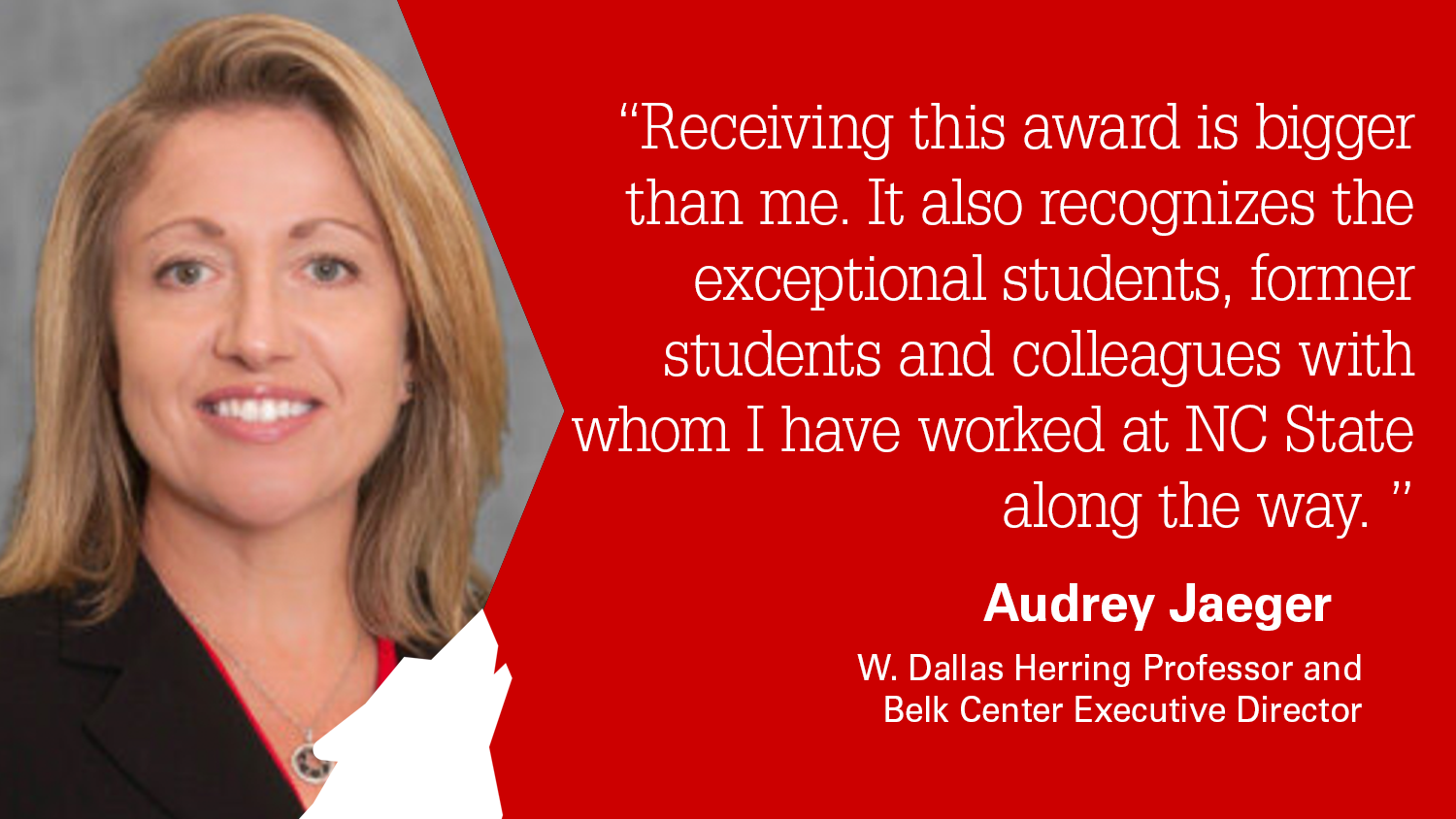W. Dallas Herring Professor and Belk Center Executive Director Audrey Jaeger Receives Holladay Medal from NC State

Audrey J. Jaeger, W. Dallas Herring Professor and Executive Director of the Belk Center for Community College Leadership and Research, has been selected to receive the Alexander Quarles Holladay Medal for Excellence.
The award is the highest honor given by NC State and the Board of Trustees, recognizing outstanding and sustained contributions to the university through achievements in research, teaching, or extension and engagement. Jaeger is one of five NC State faculty members to receive the award this year.
“To be recognized among these exceptional faculty at NC State is humbling. I am grateful to have learned from — and with —these Hollday medal recipients, and ones who have come before them,” Jaeger said. “Receiving this award is bigger than me. It also recognizes the exceptional students, former students and colleagues with whom I have worked at NC State along the way. They drive me to be a better educator, researcher, mentor and friend. For that, I’m grateful.”
Jaeger earned her Ph.D. from New York University and joined the College of Education in 2001. She was previously inducted into the Academy of Outstanding Teachers, the Academy of Outstanding Faculty Engaged in Extension and the Research Leadership Academy at NC State. In 2020, she was also awarded the Alumni Association Outstanding Research Award.
Her research has illuminated equity gaps in faculty workloads as well as issues related to college access, climate, agency, language and civic and community engagement among faculty and students. Her work advances equitable student success and institutional effectiveness by bringing actionable data to leaders and policymakers in North Carolina and beyond.
The work she said she is most proud of is her role in founding and developing the Belk Center, which has served all 58 community colleges in the state and has collaborated with community college leaders to meet the needs of colleges and support student success.
“The talented and committed team we’ve assembled within the Belk Center and through our strategic partnerships is beyond what I could have imagined,” Jaeger said. “I’m most proud of being part of a team that is firmly committed to our mission — developing and sustaining exceptional community college leaders who are committed to advancing equitable college access and student success, the social and economic mobility of their colleges’ students, and the economic competitiveness of their regions. “
Recently, the Belk Center kicked off its Rural College Leaders Program (RCLP), a capacity-building program designed to close equity gaps and improve student outcomes for 10 community colleges serving rural North Carolina communities.
In the past year and in partnership with Achieving the Dream and the North Carolina Student Success Center, the Belk Center has also launched Teaching & Learning Hubs for community college educators. The hubs were created in direct response to a Dallas Herring Lecture delivered in 2019 by Achieving the Dream President Karen Stout, which focused on a call to action for community colleges to develop a culture of teaching and learning excellence.
Last year, as a result of research on adult learners, the Belk Center team partnered with the John M. Belk Endowment, myFutureNC and the North Carolina Community College System to launch NC Reconnect. The initiative is designed to engage adults who have not completed a postsecondary credential and connect them to educational pathways at local community colleges that will lead to improved career opportunities.
Research in this area, Jaeger said, has led to practical implications surrounding ways to best support returning students of color, in particular.
“From our earliest days at the Belk Center, I wanted to ensure that our research directly addressed critical problems of practice facing community colleges today and tomorrow,” Jaeger said. “We want to go beyond knowledge for knowledge’s sake and have informed, actionable research that our community college partners can put into practice.”
- Categories:


